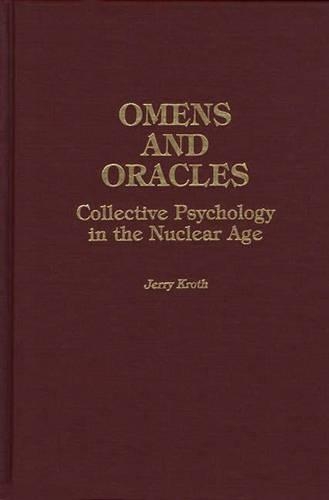
Omens and Oracles: Collective Psychology in the Nuclear Age
(Hardback)
Publishing Details
Omens and Oracles: Collective Psychology in the Nuclear Age
By (Author) Jerry Kroth
Bloomsbury Publishing PLC
Praeger Publishers Inc
24th February 1992
United States
Classifications
Tertiary Education
Non Fiction
Social, group or collective psychology
154
Physical Properties
Hardback
240
Description
Using depth psychology to develop a globally rooted psychoanalytic perspective, Jerry Kroth explores the psychological underpinnings of events, conflicts, and changes that may have deeper symbolic meanings than we generally suppose. Through his strategy of treating "real" occurrences as dreams arising from the collective unconscious, Kroth is able to derive clues to the significance of present happenings and identify incidents that have accurately predicted subsequent events. Beginning with a dream interpretation approach to the Jim Jones phenomenon, Kroth discusses the power of the trickster archetype in American society. In another chapter, he connects the panic following Orson Welles's 1938 radio broadcast of H.G. Wells's "War of the Worlds" to a collective dream anticipating the cataclysm of World War II, which was to unfold only 11 months later. In the remaining chapters Kroth sifts through some of the omens and oracles that confront us today, finding many of the same foreboding conclusions. His examination of the Gorbachev revolution from the standpoint of Russian national character and psychohistory yields future scenarios less optimistic than have usually been anticipated. Other topics addressed are the collective dreams and portents encoded in the mass media, the Cambodian disaster as an aspect of the American shadow, and Israel's David-and-Goliath duel with the Palestinians. This work is aimed at alerting us to the fact that consciously perceived events contain vital symbolic information on the psychological "state of the union" and suggest a number of unsettling future scenarios. The work is appropriate for general readers as well as classes and studies in clinical psychology, social psychology, cultural anthropology, political science, and related fields.
Reviews
The narrator is a raconteur and in being so becomes part of the narrative. In the present case, the accounts read like science fiction or TV episodes from Rod Sterling's Twilight Zone.'-Contemporary Psychology
This book is an important and original contribution to psychohistorical scholarship. It makes a strong case for giving meaning predominance over cause. Focusing more on meaning should inevitably result in deepened psychohistorical understanding.-Journal of Psychohistory
"The narrator is a raconteur and in being so becomes part of the narrative. In the present case, the accounts read like science fiction or TV episodes from Rod Sterling's Twilight Zone.'"-Contemporary Psychology
"This book is an important and original contribution to psychohistorical scholarship. It makes a strong case for giving meaning predominance over cause. Focusing more on meaning should inevitably result in deepened psychohistorical understanding."-Journal of Psychohistory
Author Bio
JERRY KROTH is an Associate Professor, and Chairman of the Graduate Division of Counseling Psychology and Education, at the University of Santa Clara. He has published books in the areas of counseling psychology, child sexual abuse, learning disabilities, metapsychology, and research methodology, together with articles on a variety of other topics.
